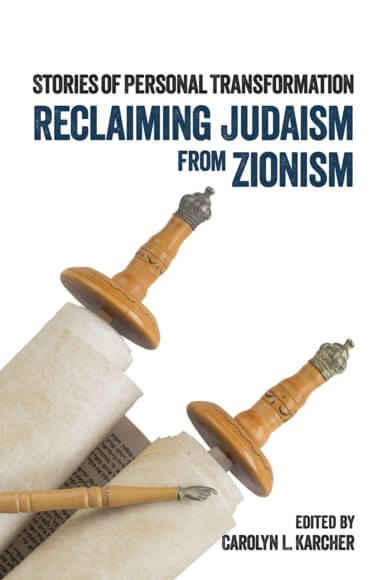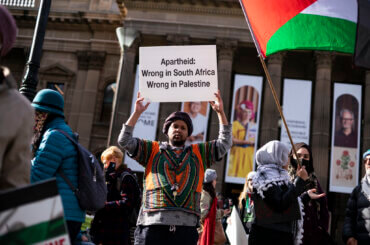Editor’s Note: “Reclaiming Judaism from Zionism: Stories of Personal Transformation,” is a collection of autobiographical essays from 40 Jewish activists and scholars, including Joel Beinin, Sami Shalom Chetri, Ella Shohat and Alice Rothchild. Other contributions are from organizers who have led an emerging generation that has created Jewish communal life that stands apart from Zionism, from the founders of Jewish Voice for Peace, to IfNotNow, to Open Hillel.
RECLAIMING JUDAISM FROM ZIONISM
Stories of Personal Transformation
Edited by Carolyn L. Karcher
400 pp., Olive Branch Press Northampton, $20
Carolyn Karcher, editor of “Reclaiming Judaism from Zionism: Stories of Personal Transformation,” has constructed an anthology that addresses the departure from Zionist ideology of a diversity of Jews from both the U.S. and Israel. Each section gives voice to a particular segment of Jews critically considering the impact of Zionism on their lives and choices, and most importantly, the life-threatening consequences of this ideology for Palestinian residents of Israel, and for those who live in the occupied West Bank and Gaza. The contributors are a variety of individuals who have been transformed through their first-hand experiences in Israel and the occupied territory. Some focus directly on their progressive political consciousness that challenges Zionism, and others have addressed their awareness as a wake-up call to action. The articles contextualize the harm of ethnic exclusivity, colonialism and imperialism, all hallmarks of post-1948 Zionism. I eagerly entered this text with a sense that this book would address some of my concerns, including the ongoing violence towards Palestinians in the occupied territory.
Although the five chapters are organized around the contributors positionality and influences regarding their transformative experience of identifying as anti-Zionist, they share many similarities. The most striking one is the reactions of non-Israeli contributors to their experiences in Israel and the occupied territory. Many were not prepared for the Israeli version of Jim Crow they encountered during their visits. The contributors come from different positions in U.S. society, their reports address their findings of the privileges of white European Jews, and the values and practices that accompany this racial supremacy and preference in Israel. There are also entries from Israelis who address these injustices in their country as well.
Not surprisingly, skin color and race plays a central role in their collective criticisms of Zionism and Israeli practice. In addition to Palestinian oppression, Mizrahi (Middle Eastern Jews) and Sephardic (descendants of Jews from the Iberian Peninsula) also experience significant discrimination in Israel. Surprisingly, no contributors mention the racism and discrimination suffered by Ethiopian Jews in Israel.
Throughout the book, we learn about the disconnect for many contributors between their uncritical childhood relationship with Israel and their adult analysis that recognizes Palestinian displacement alongside the Jewish history of persecution. In describing their journeys of self-discovery, many found meaning in political work, by joining or creating progressive political groups including the Palestinian initiated Boycott, Divestment, Sanction campaign, Jewish Voice for Peace and Students for Justice in Palestine.
The final chapter attempts to bring closure to the book through a discussion on community building and the role of activism. Contributors describe their political involvement, especially with Jewish Voice for Peace, the importance of being visible and the significance of supporting BDS. They address the need for more Americans to refuse to support Israeli policies that are discriminatory, and the role of grass roots organizing to disrupt the structural power that has traditionally supported Israel.
In the afterward, Karcher reports on the work of Ilan Pappe, an Israeli scholar whose research detailed the destruction of Palestinian villages and the early plans from the 1930’s when Zionists began collecting information on Arab villages. Karcher should have included this information in her introduction, not the Afterword. Pappe’s research confirms that Israel, like Jim Crow America and Apartheid-era South Africa, were and are nations that limited rights and civil liberties to members of a dominant culture based on ethnicity and skin color.
I can relate to several of the narratives of the included authors. Feminist organizing and anti-war activism during the Vietnam era launched my entry into a critique of Zionism. Although my home was not an especially Zionist one, it was one with a strong sense of Jewish identity and both of my parents’ recollections of anti-Jewish assaults that marked their European childhoods. These traumas did not make them Zionists. My Zionist indoctrination came from my Hebrew school education, in both elementary and secondary school. The organized Jewish community promoted and strengthened Zionism in the U.S. It also promoted propaganda that supports the denial of the rights of Palestinians to their homeland. The U.S. has consistently supported the establishment of the state of Israel, to the tune of several million dollars a day. The Obama administration brokered a deal to give Israel $38 billion dollars in aid over a 10 year period. Karcher could have emphasized more clearly this level of support of the U.S. for Israel and how this support maintains the status quo and encourages more discrimination and abuse of the Palestinian population.
This book is valuable in that it describes and gives voice to the challenge to distance one’s self from an ideology that is presented as a liberation movement. These voices must contend with being called anti-Semitic and self-hating Jews by strangers as well as by family members. Jewish nationalism, as in other forms of nationalism spreading across the globe, is by its very nature discriminatory, creating Us and Them polarities that favor the dominant culture over all others. Israel has been able to do this because of American tax-payer money to the tunes of billions of dollars over the decades. This book would have been stronger had the editor provided more information about the role of the U.S. in supporting Israel and its abusive treatment of Palestinians and Israelis of color. However, the book does address its main focus, how Jewish people can become opposed to Zionism and how to get there.




From a historical perspective, until the mass murder of European Jewry, most Jews were not Zionists. In 1927 more Jews left Palestine than arrived.
Orthodox Jews established Agudat Yisrael in 1912. It is still a political party in Israel, but in practice has made its peace with the State of Israel. Among the ultra-Orthodox, the Satmar Chasidim still maintain active opposition to Zionism.
At the other end of the Jewish theological spectrum, as Carolyn Karcher’s introduction to the book discusses, the 1885 Pittsburgh Platform of Reform Judaism forthrightly opposed Zionism. Reform opposition to Zionism was moderated somewhat in the 1937 Columbus Platform. But American Reform Judaism did not embrace Zionism ideologically until after the 1967 War, although some prominent rabbis and individuals were active Zionists much earlier. What Orthodox and Reform Judaism have in common is that they understand Jews primarily as a religious community.
A contrasting view was presented by the General Jewish Labour Bund in Lithuania, Poland and Russia, an anti-Zionist, secular, Yiddishist, revolutionary socialist organization. The Bund was established in 1897, the same year as the World Zionist Organization. The Bund believed that the Jews of Eastern Europe constituted a people (they knew nothing about the Jews of the Middle East and North Africa, India, etc.), that Yiddish was their national language, and that Eastern Europe was their homeland. In the first years of the 20th century the Bund was the largest socialist organization in the Russian Empire. It also had a large following in interwar Poland and was transplanted to the United States over the course of the 20th century.
Much of what the Bund believed is no longer relevant, and there are few, if any, actual members of the Bund alive today. But its understanding of Jews as a diasporic people (or an ethnic group in contemporary American terms) defined by a common culture which does not necessarily include religion and whose political loyalties should be to the country in which they live has much to recommend it. This formulation leaves open the possibility of a spiritual or emotional connection to the Land of Israel (but not the existing State of Israel) for those who desire it.
A reminder:
Prophetic statements by eminent Jews:
Then Secretary of State for India and the British cabinet’s only Jewish member, Lord Edwin Montagu’s response to Prime Minister Lloyd George following issuance of the illegal 1917 Balfour Declaration: “All my life I have been trying to get out of the ghetto. You want to force me back there.”
Henry Morgenthau Sr., former U.S. Ambassador to Turkey, 1919: “Zionism is the most stupendous fallacy in Jewish history…. The very fervour of my feeling for the oppressed of every race and every land, especially for the Jews, those of my own blood and faith, to whom I am bound by every tender tie, impels me to fight with all the greater force against this scheme, which my intelligence tells me can only lead them deeper into the mire of the past, while it professes to be leading them to the heights. Zionism is… a retrogression into the blackest error, and not progress toward the light.” (Quoted by Frank Epp, Whose Land is Palestine? p. 261)
Asked to sign a petition supporting settlement of Jews in Palestine, Sigmund Freud declined: “I cannot…I do not think that Palestine could ever become a Jewish state….It would have seemed more sensible to me to establish a Jewish homeland on a less historically-burdened land….I can raise no sympathy at all for the misdirected piety which transforms a piece of a Herodian wall into a national relic, thereby offending the feelings of the natives.” (Letter to Dr. Chaim Koffler Keren HaYassod, Vienna: 2/26/30)
In 1939, Albert Einstein wrote: “There could be no greater calamity than a permanent discord between us and the Arab people. Despite the great wrong that has been done us [in Europe], we must strive for a just and lasting compromise with the Arab people…. Let us recall that in former times no people lived in greater friendship with us than the ancestors of these Arabs.” (Einstein and Zionism by Banesh Hoffmann, in General Relativity and Gravitation, eds G. Shaviv and J. Rosen, Wiley, 1975, p. 242)
Lessing J. Rosenwald, president of the American Council for Judaism, 1944: “The concept of a racial state – the Hitlerian concept- is repugnant to the civilized world, as witness the fearful global war in which we are involved. . . , I urge that we do nothing to set us back on the road to the past. To project at this time the creation of a Jewish state or commonwealth is to launch a singular innovation in world affairs which might well have incalculable consequences.”
I am sick and tired of hearing this “self hating Jews”…All those Germans who were against Hitler…should they be labelled “self hating Germans”???
In the 1920s there was an attempt to form an area of compact Jewish settlement in northern Crimea and the adjacent region of southern Ukraine (Kherson). Jewish villages and collective farms were established and Yiddish became a language of state administration in the counties with substantial Jewish settlement. However, further settlement in Crimea was opposed by the leaders of the Crimean Tatar autonomy. When Stalin came to power at the end of the 1920s he broke up the embryonic Jewish autonomy in southern Ukraine and northern Crimea and created Birobidzhan as an alternative. The Crimean Tatars were deported in 1944 for alleged collaboration during the German occupation of Crimea. That made a Jewish autonomy in Crimea more feasible and after the war the Jewish Anti-Fascist Committee lobbied the Soviet government for the creation of such an autonomy to settle Jewish war refugees. Stalin did not like the idea and this was one of the main reasons why Stalin suppressed the JAFC.